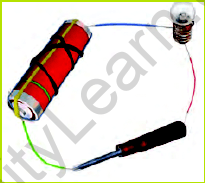Table of Contents
NCERT Solutions for Class 6 Science Chapter 12 Electricity And Circuits 2024 -25
NCERT Solutions for Class 6 Science Chapter 12 Electricity and Circuits has answers and explanations to fill in the blanks, true or false, circuit diagram, and descriptive answering questions, which will guide you in understanding the concepts involved in the class 6 science chapter 4 Electricity and Circuits. These NCERT Solutions for Class 6 Science Chapter 12 has questions related to an electric cell, electric bulb, electric circuits, switches, conductors and insulators, examples of conductors and insulators.
PDF of Chapter 12 of NCERT Solutions consists of accurate solutions, which help the students to quickly complete their homework and prepare well for the exams. It ensures that you get all the necessary information of all concepts included in the chapter. Class 6 is a critical level as it forms the base for students for the forthcoming academic years. So, students who aspire to attain good marks in Science practice CBSE Sample papers without fail.

NCERT Solutions Class 6 Science Chapter 12 PDF Download 2024 – 25
Here is the updated NCERT solutions for class 6 science chapter 12 pdf question answer from NCERT textbook class 6 science
Class 6 Science Chapter 12 Question Answer – Electricity And Circuits
Here are all the NCERT class 6 science chapter 12 questions and answers from NCERT textbook for the year 2024-25
Class 6 Chapter 12 Science Questions Answers Page No. 123-24
1. Fill in the Blanks:
a) A device that is used to break an electric circuit is called a __________.
b) An electric cell has _________ terminals.
Answers :
a) Switch b) Two
2. Make ‘True’ or ‘False’ for the following statements.
a) Electric current can flow through metals.
b) Instead of metal wires, a jute string can be used to make a circuit.
c) Electric current can pass through a sheet of thermocol.
Answers :
a) True b) False c) False
3. Explain why the bulb would not glow in the arrangement as shown in the figure.

A. An electric current cannot pass through objects such as plastic scales, tester holders, etc., because these objects are bad conductors of electricity.
It can be observed that one terminal of the bulb is connected to a tester holder. The current will not flow through the circuit. Hence, the bulb would not glow.
4. Complete the drawing shown in the figure to indicate where the free ends of the two wires should be joined to make the bulb glow.

A. The given circuit is not complete. To complete the circuit, the positive terminal of the cell should be connected to one end of the switch and the negative terminal of the bulb should be connected to the other end of the switch. The closed-circuit is:

5. What is the purpose of using an electric switch? Name some electrical gadgets that have switches built in them.
A. A switch is an electrical device that is used to complete or break an electrical circuit. If the switch is ‘ON’, then a current can flow through the circuit. However, if the switch is ‘OFF’, then the current cannot flow through the circuit. Electrical appliances such as table fans, electric lamps, washing machines, juicer and mixers, TV, radio, etc., have switches built into them.
6. Would the bulb glow after completing the circuit shown in the figure, if instead of a safety pin, we use an eraser?

A. Erasers are bad conductors of electricity. They do not conduct electricity. The circuit becomes an open circuit. Hence, the bulb will not glow if a safety pin is replaced with an eraser.

7. Would the bulb glow in the circuit shown in the figure?

A. The bulb will not glow. This is because the two terminals of the cell are connected to the single terminal of the bulb. This is equivalent to the bulb not being connected to the circuit at all. The two terminals of the bulb should be connected to the two terminals of the cell.
8. Using the “Conduction tester” on an object it was found that the bulb begins to glow. Is that object a conductor or an insulator? Explain.
A. When the two free ends of the ‘conduction tester’ are touched with an object, then the bulb of the tester would glow if the object conducts electricity. However, the bulb would not glow if the object does not conduct electricity. Since the bulb glows when the tester is touched with the object, the object must conduct electricity. Hence, the object is a conductor.
9. Why should an electrician use rubber gloves while repairing an electric switch at your house? Explain.
A. An electric switch is an electric appliance. It conducts electricity through its internal parts. When its internal parts are touched with bare hands, then it may cause an electric shock. Therefore, it should be touched with rubber gloves in hands because rubber cannot conduct electricity. Hence, electricians wear rubber gloves while repairing a switch or any other electrical appliance.
10. The handles of the tools like screwdrivers and pliers used by electricians for repair work usually have plastic or rubber covers on them. Can you explain why?
A. Rubber is a bad conductor of electricity. It does not allow current to flow through it. Hence, handles of tools such as screwdrivers, pliers, etc., which are used by electricians for repair use rubber cover on them. This protects them from electric shocks.
- Chapter 1 Food: Where Does It Come From?
- Chapter 2 Components of Food
- Chapter 3 Fibre to Fabric
- Chapter 4 Sorting Materials Into Groups
- Chapter 5 Separation of Substances
- Chapter 6 Changes Around Us
- Chapter 7 Getting to Know Plants
- Chapter 8 Body Movements
- Chapter 9 The Living Organisms and Their Surroundings
- Chapter 10 Motion and Measurement of Distances
- Chapter 11 Light, Shadows, and Reflection
- Chapter 12 Electricity and Circuits
- Chapter 13 Fun with Magnets
- Chapter 14 Water
- Chapter 15 Air Around Us
- Chapter 16 Garbage In, Garbage Out
Overview of Class 6 Science Chapter 12 NCERT Solution
Class 6 Science Chapter 12, titled “Electricity and Circuits,” introduces fundamental concepts of electrical energy. It covers electricity, circuits, and electrical components such as electric cells, bulbs, and switches, along with conductors and insulators. The chapter also emphasizes safety in handling electrical equipment.
NCERT Solutions for this chapter provide detailed answers and explanations to various types of questions, including fill-in-the-blanks, true or false, circuit diagrams, and descriptive questions. These solutions help clarify complex ideas and enhance students’ understanding of the chapter.
The benefits of these solutions include clarifying concepts through simplified explanations, enhancing problem-solving skills with step-by-step guidance, and assisting in efficient homework completion and exam preparation. They also build a strong foundation for higher classes, ensuring students are well-prepared for future scientific studies.
Important Topics Covered in NCERT Solutions for Class 6 Science Chapter 12 Electricity and Circuits
- Electric cell
- A bulb connected to an electric cell
- An electric circuit
- Electric switch
- Electric conductors and insulators
INFINITY LEARN is a premier online education provider which gives NCERT Solutions, NCERT exemplar, sample papers, previous year question papers, notes, textbooks, tips, and tricks for all subjects of all the classes. To get free access to all the study materials we provide, download the INFINITY LEARN learning App.
| Other Resources for Class 6 | |
| Worksheet for Class 6 All subjects | CBSE Notes Class 6 |
| NCERT Books for Class 6 | Online Tuition for Class 6 |
FAQs on NCERT Solutions for Class 6 Science Chapter 12
What is the name of Chapter 12 in Class 6 science?
Chapter 12 in Class 6 Science is titled Electricity and Circuits. It introduces students to the basics of electrical concepts and applications.
What is an electric circuit in Class 6? (Very short answer)
An electric circuit in Class 6 science is a pathway that allows electric current to flow through it, typically involving a power source, wires, and a load like a bulb.
What is a switch Class 6?
In Class 6 science, a switch is a device used to open or close an electric circuit. It controls the flow of electricity by starting or stopping the current.
What is a closed circuit Class 6?
A closed circuit in Class 6 science is a complete electrical connection around which current flows without interruption, allowing devices in the circuit to operate.
Where to download NCERT Solutions for Class 6 Science?
NCERT Solutions for Class 6 Science can be downloaded from Infinity Learn, among other educational websites. Infinity Learn provides comprehensive study materials that include detailed explanations and answers, helping students excel in their studies by understanding key concepts thoroughly.
Explain the use of an electric switch from Chapter 12 of NCERT Solutions for Class 6 Science.
Electric switches are used to complete or break a circuit in various electrical gadgets like refrigerators, fans, microwave ovens, televisions, and electric cookers. The NCERT Solutions provide diagrammatic representations for visual learning and use simple language to aid understanding. The solutions are systematic, improving problem-solving abilities for exams.
What type of questions can I expect from Chapter 12 of NCERT Solutions for Class 6 Science?
Chapter 12 of NCERT Solutions for Class 6 Science includes about 10 questions, such as short answer questions and fill-in-the-blanks. These solutions help students who struggle with the textbook questions, enhancing their problem-solving skills. The interactive solutions cover all fundamental concepts, preparing students for changes in the industry.
What topics can I learn from Chapter 12 of NCERT Solutions for Class 6 Science?
Chapter 12 covers topics like electric cell, bulb connected to an electric cell, electric circuit, electric switch, and electric conductors and insulators.









